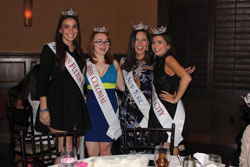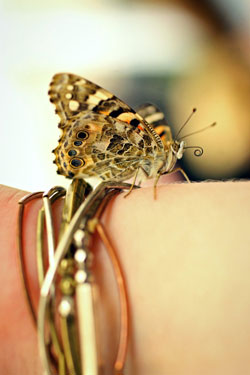When people think of beauty pageants, the first thing that comes to mind is girls up on stage, decked out in their best attire with their makeup and hair expertly styled. On the other hand, some people take notice of the hard work, dedication, and preparation that goes into these events. The talk about pageants is so intriguing due to the multiple views associated with them—do they objectify women and showcase them as just pretty objects? Or, do they pro-vide women a platform for empowerment?
Eleanor Novek, Professor of Communication, points out that a big aspect of beauty pageants comes from the name itself: beauty. “Unfortunately, the primary emphasis of a beauty pageant is physical beauty,” she explains. “So young women who might otherwise spend time excelling in sports, or doing science experiments, or writing a novel, or becoming a musician, or traveling and learning about other languages and cultures, or developing their talents through other ways, instead spend the majority of their spare time and energy on their outward appear-ance.” Beauty pageants have been shown to lower young women’s self-esteem, which can lead to plastic surgery and eating disorders.
A big issue in our society is the notion of physical appearance, especially that of women and their femininity. Women and young girls care more about their looks, how skinny and fit they are, and what their hair and makeup look like. The pressure to look like the girls on stage when you’re watching Miss America on TV can affect a lot of girls negatively. However, there are positive aspects to these pageants that viewers might not realize.
There are Monmouth University students among us that have had this opportunity and experience. Lexi Swatt, a graduate from the class of 2016, earned the title of Miss Fulton County, and is a member of the Miss America Or-ganization. “I definitely knew I wanted to compete, and the goal I wanted to reach,” Swatt describes. “It was diffi-cult preparing for the pageants, mentally and physically. I was still at Monmouth at the time, so it was difficult to eat healthy, get enough of sleep, and practice skills I needed to have to perform, but also live the life of a college student.” The preparation and determination that goes into pageantry are aspects many people probably aren’t aware of.
 There is a stigma around pageants and these women who are competing. Not everyone sees competing in the same light. “I love everything, but I hate the stigma around it,” Swatt confesses. “Pageants are for empowered women who have a vision of making themselves stronger and better, and empower other women to do the same, and come together as one.” The focus on empowerment is something we could focus on more than just the physical beauty of the women who compete. To further that goal, recently Miss Teen USA decided to eliminate the swim-wear part of their competition; instead, the contestants will focus on the importance of physical fitness by wearing athletic wear.
There is a stigma around pageants and these women who are competing. Not everyone sees competing in the same light. “I love everything, but I hate the stigma around it,” Swatt confesses. “Pageants are for empowered women who have a vision of making themselves stronger and better, and empower other women to do the same, and come together as one.” The focus on empowerment is something we could focus on more than just the physical beauty of the women who compete. To further that goal, recently Miss Teen USA decided to eliminate the swim-wear part of their competition; instead, the contestants will focus on the importance of physical fitness by wearing athletic wear.
Swatt has learned many things about herself and her confidence has increased over the course of her journey in becoming Miss Fulton County and with her work in the Miss America Organization. “I now have the confidence to be more outgoing, to speak up about a certain issue or situation, and just talk among a crowd of people,” Swatt explains. “When I would be backstage waiting for my turn, my stomach would be in knots; I was nervous. Once I got on stage, I used to black out, and not really remember what exactly I said. But, that comes with it; it’s a learning experience and an adjustment.”
“It has also helped me in my career as well,” Swatt points out. “In interviews, I am no longer timid or shy when answering and asking questions, and speaking up during meetings.”
Kaitlyn Jones, a senior health studies student at Monmouth University and one of Swatt’s closest friends, could see the growth. “Lexi has that confidence,” Jones says. “She can spark a conversation with anyone, and she has the ability to light up the room. I have to say I am extremely proud of her, I know the preparation was not easy, and the competition itself is tough. The judges watch your every move, but I know she would come out on top. I look up to her.”
“I always say that pageants are not about changing yourself, they are about showcasing yourself,” Swatt said. Pageants provide a platform for these women to express themselves and their views on, and to look their best while doing it.
Beauty pageants can be looked at through two lenses; as a negative or as a positive. Pageants can be deemed sexist and anti-feminist from one angle, but the women involved are definitely independent and driven women. As small changes, like the elimination of bikini wear, begin to grow, maybe pag-eants will become less controversial. Either way, it is best to love yourself first, and not feel like you owe anyone anything and have to look a certain way. Everyone is beautiful and unique.
IMAGES TAKEN from facebook.com/alexis.swatt



